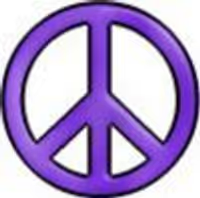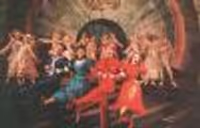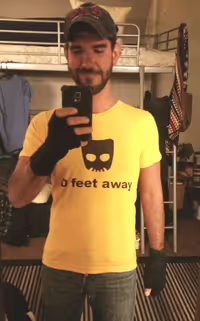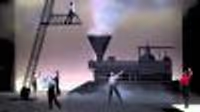Assassins - I'm confused
#25ASSASSINS
Posted: 11/5/11 at 9:00pmI don thnk it makes it more marketable, althugh I do think it allows audience to somewhat escape the mindset of the assassins themselves--it briefly moves the focus of the play to an area which I find breaks the power of the rest of the piece. It's a pretty boneheaded move--yes a good production that includes it can still be very effective, but it's despite of the song, not because of.
#26ASSASSINS
Posted: 11/5/11 at 10:12pm
I think it's a very interesting moment, because it is the first time that the show's characters and focus move completely outhe realm of "history" and into (for most of the current Broadway-going public) still-recent events. Chances are, no one has any genuine emotions about the assassination of Lincoln- for as long as anyone has been alive, Lincoln has been dead, shot by John Wilkes Booth. Similarly, the failed assassins are just that- failures. They left no mark on history, and thus have no enormous cultural resonances.
When we hear the assassins' Pippin-esque promises of "You can close the Stock Exchange," on one level we know they are right. But on another level, we know that most of them have been shown to be self-deluded individuals, not exactly paragons of perception or even of sanity. When they push Lee to fire that fatal shot, and the show goes just to "Everybody's Got The Right," it is, as someone said below, just another "I am, I did" moment. But when it is preceded by "Something Just Broke," we are forced to confront not only our memories of the Kennedy assassination and its aftermath, but the realization that the assassins were RIGHT- shooting the president DOES have enormous aftershock on the rest of the nation, something that is not addressed or discussed for the entirety of the show, save there.
All of a sudden, the focus shifts- the show is no longer about the assassins, our villain protagonists. All at once we see that it is the country itself who is the main character in the work. The arguments that it was a commercial move, and pandering to the need to "mourn after 9-11" have good points to make, but the difference in the public opinion and feelings on the Kennedy assassination versus the Lincoln, etc. are rather like the feelings on 9-11 versus Pearl Harbor for the majority of Americans, and I think Sondheim must have realized that.
#27ASSASSINS
Posted: 11/5/11 at 11:02pmThat's a great argument for the inclusion of the song--and one that I admit makes sense. And yet, I still think it also works to explain why the song doesn't fit. I do think it makes the assassins more clearly villains when we return to the ending and Everybody's Got the Right reprise after Something Just Broke. It makes it a much more comfortable show in that we leave the theatre with the firm idea that the assassins are to blame, are villains, and are outsiders.
#28ASSASSINS
Posted: 11/5/11 at 11:05pm
I get what you're saying, that the number seems to change the intent of the show to ask "were these men victims of Americanism through the ages, not villains?"
That said, I think it's intentional. The show sets up that moral ambiguity so that after Kennedy is shot, it can skewer it completely and shoot it all to hell. Instead of the final "Everybody's Got The Right" being the final question of "were they really as bad as history paints them, or did they have good reason for what they did," the number is much more darkly ironic than it was even at the beginning, now that we have seen outside the minds of the Assassins for the first time.
#29ASSASSINS
Posted: 11/5/11 at 11:12pm
I think "Something Just Broke" is an asset to the show. It reminds us that, despite feeling like/being outsiders, the assassins' very acts damaged and hurt the dreams and lives of others. Is it right to take away from others what you feel you have been denied?
The song, I feel, doesn't pat the audience on the shoulder and say, "Don't worry, this show isn't saying the assassins are blameless". The assassins aren't portrayed sympathetically enough otherwise for one song to reverse it. And not to mention, their victims aren't portrayed sympathetically either.
#30ASSASSINS
Posted: 11/5/11 at 11:51pmWhy the song works so well and is so important is that throughout the show, nobody in the audience has any personal connection with any of the assassinations. They're stories from a book or on the History Channel. When Kennedy is killed though, people watching either remember that moment vividly or have heard from their parents about where they were when it happened and the impact is well documented. The song serves to put everything we have just seen into perspective and when the words "The President is dead" are spoken, the entire point of the show is clear.
#31ASSASSINS
Posted: 11/6/11 at 12:22am
So playing Devil's Advocate, does that mean in a hundred years they might as well cut the song again--when the reaction to the Kennedy assasination is as much a part of the past as Lincoln's was?
I still think the show makes it clear, particularly through the Baladeer, in a less obvious and more striking way that their actions "damaged and hurt the dreams of others" (particularly obviously in Balld of booth which kinda opens the framework that's closed with the powerful penultimate episode with Oswald). I do think it's telling that Weidman and Sondheim have both gone much more ambivalent about its use in the play (musically I don't think it really fits either--one of the few musical things with Sondheim being that often when he adds songs, they sound more like whatever project he's working on at the time--ie Country House in Follies could musically be in Into the Woods as much as Follies).
I admit, part of my problem is I wasn't fully happy with the Roundabout production (and I agree with Sondheim's misgivings on some other things--ie Unworthy of your Love is musically meant to sound like a pleasant Carpenters' style song--so why is it so unattractively sung in the Braodway production which ruins its whole chilling effect?)
#32ASSASSINS
Posted: 11/6/11 at 12:26am
Oh, in a hundred years (even 50 years) the ending won't have the impact it has now. Part of me wants to call it a flaw but I can't see doing that because there's always references to current events in theater/film etc. that are going to resonate more with audiences closer to the events they're talking about. But what I think won't change is that it will put the entire show in perspective about how an act like that changes the world and changes peoples lives. The weight of it all.
I also agree that it doesn't exactly "fit" with the rest of the score but in this circumstance I think that's exactly what it DOES "fit". If that makes any sense at all.
#34ASSASSINS
Posted: 11/6/11 at 1:16am
Eric, you're right to stick to your original opinion. The inclusion of the song is not what holds ASSASSINS together; all it does is tell us something we already know and feel. It takes something that we should be intelligent enough to know, that Sondheim should trust us enough to know, and puts it on stage for what seems an eternity. We know this kind of event changes peoples lives. We know it has a human effect. We would have to be blind not to recognise that, because this KIND of event happens all the time. What was brilliant about ASSASSINS before "Something Just Broke" went in was that the dialogue that builds up to the gunshot and the music that erupted after communicates EVERYTHING that "Something Just Broke" does without spelling it out for us like we're a bunch of second graders. And then with that immediate feeling that's been put into your gut, so intense because it hasn't been made completely flaccid by Sondheim's equivalent of "Music of the Night" (harsh and hyperbolic, I know), it segues into a final "Everybody's Got the Right", which can fully embrace its horror and irony.
Your devil's advocate argument is on the mark: in 100 years, the song might as well be cut again. Actually, it might as well be cut now, because unless we in the audience are as psychopathic as the assassins themselves, it isn't something we need spelled out for us in four minutes of stage time in the first place. (It was all there already cf. the paragraph above.) All it does is, as you say, 'make it a much more comfortable show in that we leave the theatre with the firm idea that the assassins are to blame, are villains, and are outsiders'. Other arguments make sense and, I agree, some fair points have been raised in defence of the song, as is always the case, but as you implied earlier, these are perspectives that make the song work in spite of itself.
3bluenight
Stand-by Joined: 8/10/11
#35ASSASSINS
Posted: 11/6/11 at 6:49am
I tend to agree with eric and rainbow in that Something Just Broke, for me, takes the piece to such a literal place that it become redundant, unnecessary and shoehorned.
Rainbow makes such a strong argument for musical subtly. As noted, I believe in the linear notes for the OCR, when the orchestra moves into the Hail to the Heroes motif after JFK's assassination, I do hear the mourning - the wailing of a country in mourning.
I'm also not sold on the idea that the public's reaction to assassins is really a theme that's set up in the show. That is why i find it imposed on the piece rather than a natural evolution of the argument/conversation.
I agree that one of the ideas at play is that this energy - these ideas - are a part of the American reality - a subversion of the dream, a mistinterpretation of the dream, but a part of it nonetheless. If we embrace the idea of balance of equilibrium, then the right to pursue - whatever our pursuits may be - are not hindered by - are not a perversion of - but a something that is always there. something that is always fighting for inclusion in the process.
if we look at people with mental disorders, it's not so much that they're ill, but that they don't fit into most cultures' rules of civil behavior. they don't conform (territory that has been explored by sondheim in anyone can whistle).
I think the balladeer does serve to represent a public that is both enthralled with and horrified by the acts of the assassins. I also see that character as an antagonist. the balladeer provokes as much as reacts. it's not just that the character is the audiences' panacea, but the character is a story teller, the one left standing to interpret and to perpetuate whatever ideas he/she has about the acts of the assassins.
#37ASSASSINS
Posted: 11/10/11 at 10:55am
The real problem with Something Just Broke is that it, in a way, introduces us to a completely new cast of characters and demands that we shift out of the fever dream of the Kennedy assassination and into our 'feelings' about it. I actually found the song far more effective in Sondheim on Sondheim. It's a rather beautiful stand-alone piece. But, as it currently sits in the show, it just does not work for me.
The one way I would have remedied that (were I working on the show) would have been to make sure there was a small musical passage after each preceding presidential assassination featuring one or all of the 'everyman' ensemble members. Something that states the opposite of Something Just Broke. Something that implies that life and America will go on as before because we're stronger and better and what have you. That way, we've been introduced to these people, and a dichotomy would have been set up between the assassains and those on the other side. It would smooth the transition into Something Just Broke in a major way. Because, really, why should I care about these people now...at the end of the show? If they were introduced earlier and gave voice to American optimism, even in the face of such a tragedy, then the emotional impact of Something Just Broke would be devastating. Because something did break in 1963. Look at all that came after. Maybe I'm saying that just cause I'm close to it. Or maybe I'm saying that because history since then has been recorded for the world to see and experience...not just read. There was something different about the Kennedy assassination (the senseless of it? the visual of a Zapruder film?). It does feel like it changed everything. And saying so is not necessarily a bad idea. I just think the show as it stands does it in the most effective way possible.
#38ASSASSINS
Posted: 11/10/11 at 11:56am
I think the song "Something Just Broke" is an okay song. It's not a Sondheim masterpiece, it doesn't stick with me. But the reason I enjoy its placement in the show is a literary one. It's a Miltonian reversal.
Look at Milton's "Paradise Lost." The whole epic sets up Satan as a noble antihero, one that audiences start to root for and sympathize with for thinking outside the box and standing up to his convictions. But by the end, that subversion has been itself subverted. We realize that we have been misled and manipulated by the poem- much like a sinner would be misled and misrepresented by Satan.
The original "Assassins" was very much like the first part of "Paradise Lost." Its postmodern, post-Vietnam critique of Americanism and the American Dream left the question open- is it really okay to shoot the President? If so, when? Are these people really the heartless villains they have been portrayed as, or did they have reasons that can be understood and justified for trying to commit the ultimate American crime?
The revised "Assassins," by including just the one extra song and scene, creates the Miltonian reversal. Up until Lee Harvey Oswald shoots the gun, we have seen the show from the eyes of the Assassins themselves. Any glimpses we've seen of the American public have been as boorish, unpleasant and highly caricatured figures, especially in "How I Saved Roosevelt," making the Assassins more relatable and sympathetic than the public. But once "Something Just Broke" begins, it is as if the stage has revolved to reveal what has been behind the scenes the whole time- America, not as the Assassins see it, but as it sees itself. Suddenly, the sympathy, understanding and "rooting" we may have felt for the Assassins so far drops away. If done correctly, this should be an instant guilt trip- we have been entertained to the point of condoning moral relativism to an absurd degree, and suddenly that comfort is shaken away from us. If the original production said "Maybe shooting the president is not ALWAYS the worst possible thing that could be done, given the America we lived- and currently live- in," the revival says "Yes it is, and look how easily you can be led to believe otherwise with just a little persuasion!"
After reading over this argument, I sort of wonder if the moment would work better, or be less "controversial" to its detractors, if instead of being the penultimate scene, "Something Just Broke" was after the final "Everybody's Got The Right," or woven together so the two sentiments stand as one while contradicting each other.
After Eight
Broadway Legend Joined: 6/5/09
#40ASSASSINS
Posted: 11/10/11 at 6:04pm
I'm on the pro-Something Just Broke team by a mile. After 2 hours of Brechtian distancing onstage, this was the passage that for me allowed true empathetic feeling to flood from the stage into the house. There was another magical aspect to this song-- it's not just about the Kennedy assassination, but rather about ALL those different decades in which assassinations took place coexisting in perfect harmony. Check the costumes worn by the ensemble and check a few of the lyrics--
"I was out in the yard
Taking down the bed sheets...
I was getting me a shoeshine...
We were waiting for a carriage...
I was up near the ridge plowing
We were working at the plant
I was halfway through correcting the exams...
Mr. Garfield
Mr Lincoln
He’s a hack
Bill McKinley
He’s a giant
He’s a joke
Still, something just broke...
I was down at the Exchange...
I’d been shopping...
I’m taking the order...
It was seeing all those torches
Bringing us all together..."
Giving the audience one blissful moment when the chorus (the country) can actually come together in perfect harmony makes all that came before it worth the horror.
Gaveston2
Broadway Legend Joined: 6/28/11
#41ASSASSINS
Posted: 11/10/11 at 6:11pm
Charles, I have to wonder how many people stumble over "Something Just Broke" simply because it isn't on the original off-Bway recording and so it's "new" and "strange" to the ear. (It's also possible that some people LIKE it for the same reason.)
I'm sure everyone who dislikes it honestly believes s/he is motivated by objective criticism, but it's really difficult to tell.
#42ASSASSINS
Posted: 11/10/11 at 6:53pm
I've been involved in enough Assassins productions (all that used SJB) that I'd like to think that, while in repsect to performance and orchestrations I prefer the original Off Broadway cast album by a mile, my judgement isn't based on just being more used to the original. (I think no modern production of Into the Woods should leave out Our Little World, to use a poor comparison--and love Ah But Underneath at least as much as Lucy and Jesse, something some Follies fans will tar and feather me for.)
"Giving the audience one blissful moment when the chorus (the country) can actually come together in perfect harmony makes all that came before it worth the horror. "
I think that's more than fair. For me *personally* this is one of the major reasons the song does not work in the show. I think in one fell swoop it leaks away much of the power of the piece, and thematically is outside the scope of the piece. It could work in an interesting second act that flipss the view of the piece (though again I think that might negate the power of Assassins).
#43ASSASSINS
Posted: 11/10/11 at 6:56pm
The first time I heard it, it was very off-putting, especially because it doesn't fold into the rest of the score at all. It's a lot like "Next" is to PACIFIC OVERTURES in that way. After a short time, it grew on me, and now the piece feels incomplete to me without it.
Gaveston2
Broadway Legend Joined: 6/28/11
#44ASSASSINS
Posted: 11/10/11 at 7:20pm
Now, Eric, surely you knew I wasn't referring to you personally! You (and others) have quite ably supported your points of view here.
As for me, I've seen the show with and without "Something Broke" and I like it either way. But I must admit that having taught the published script for years and played the off-Bway OC album, THAT's the version of ASSASSINS that comes to mind when I think of the show.
#45ASSASSINS
Posted: 11/10/11 at 8:07pm
Oh, I knew you didn't mean it personally, don't worry--I felt like I should reply anyway :P
I do freely admit that when I hear Assassins in my head, it's the original cast album (and I am a bit beweildered by those who prefer the later recording, though it does have its good points).
bwayfan7000
Broadway Legend Joined: 3/28/09
#46ASSASSINS
Posted: 11/10/11 at 8:23pmPerhaps I'm a little late to the Caroline discussion, but that it didn't get at least four Tonys and a Pulitzer is a travesty. And I love Avenue Q, but still. 100% with Jordan on this one.
Gaveston2
Broadway Legend Joined: 6/28/11
#48ASSASSINS
Posted: 11/10/11 at 9:09pm
I'm a huge Neil Patrick Harris fan, but the fact is the Balladeer was written (or later adapted) for Patrick Cassidy's very specific high tenor. Nobody sings it quite like him.
(I saw Cassidy do a staged reading of the show a few years ago. The top notes aren't quite there, but the unique way the range of those songs sit on his voice is still apparent. And Annie Golden still makes a marvelous Fromme!)
Videos







